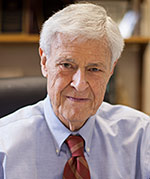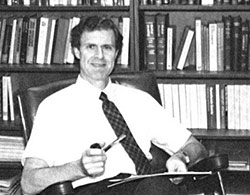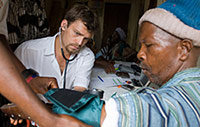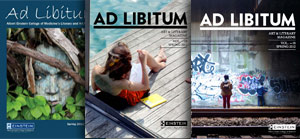

Instilling Mindset of Possibility
Dr. Albert S. Kuperman: Leaving a Lasting Imprint
Albert Kuperman grew up in the Bronx during the 1930s and 1940s. He lived in a building where tenants frequently visited and helped one another, and shared their knowledge and talents. One neighbor was a chemical engineer, another was a photography enthusiast, and several were professional musicians.

Albert Kuperman, Ph.D.Getting to know these people, he recalled recently, introduced him to different aspects of art and science and the exciting world outside. And the experience taught him the value of listening.
"Listening well is perhaps one of the most important aspects of being a good leader, a good colleague or a good friend," he noted. "Since I don't have a very assertive personality, my listening skills contributed enormously, I think, to whatever effectiveness I had as an educator, department chair and associate dean."
Pioneering Educator
Dr. Kuperman is retiring this spring. He has been Einstein's other "Uncle Albert" ever since arriving as Einstein's associate dean for educational affairs in 1975. In this role, he has helped shape the medical school curriculum in ways that have often placed Einstein at the forefront of medical education. His innovations include introducing the concept of global health education to provide opportunities that expand students' experiences with healthcare; establishing research project fellowships to encourage inquiry and increase understanding of the science behind medicine; and fostering a culture of humanism among medical students and faculty that is at the heart of Einstein's approach to medical education and research.

Dr. Kuperman, earlier in his career at Einstein"When Al took over as head of our preclinical committee, his primary philosophy was ensuring that our medical students learned what they needed to be good doctors, not just students of biology," said Dr. Edward R. Burns, executive dean at Einstein, who was appointed by Dr. Kuperman as course director of hematology. "Al empowered the course directors to develop a cadre of excellent teachers who vastly improved the educational experience for students. He urged us not to choose people who were great scientists but poor teachers."
Dr. Burns noted that Dr. Kuperman was also an early champion of small-group conferences and realized that self-teaching was at least as effective as rote learning in lectures.
The World as Oyster
The global fellowship program, which introduced the concept of global medicine to Einstein in 1976, is perhaps Dr. Kuperman's best-known contribution. Einstein became one of only a handful of institutions offering such a program.

Dan Kelly, M.D., in Sierra Leone, where he has established a clinic to help care for the nation's amputee communities"He was a visionary, innovative leader who could see the bigger picture," said Dr. Nadine T. Katz, whose role at Einstein most recently was senior associate dean of student academic affairs. (She is now medical director of Montefiore Medical Center's Einstein Campus.) "He understood the value of expanding learning beyond the classroom and into the real world."
Such real-world experiences have helped shape the careers of many Einstein alumni who have specialized in global health.
"What I'm doing in Sierra Leone would not have been possible without Dr. Kuperman," said Dr. Dan Kelly, a member of Einstein's class of 2008. During his student years, Dr. Kelly established a nongovernmental organization, Wellbody Alliance, to serve the amputee communities in the war-torn nation. He also participated in Medical Education in Cooperation with Cuba (MEDICC), a program on whose academic council Dr. Kuperman and others at American and Cuban medical institutions served, which allowed students to travel to Cuba to observe how its healthcare providers administered universal care. (State Department travel restrictions to Cuba have since greatly diminished such opportunities.)
"Taking part in the MEDICC program in Cuba exposed me to the concept of healthcare as a human right," said Dr. Kelly. "I came away with a desire to see that all who need care in the world have access to it."
Another important Dr. Kuperman legacy is the student-run Social Medicine course. Fifteen years ago, students seeking to transfer their classroom learning to the outside world lobbied for the course's creation, and Dr. Kuperman gave his strong support.
"The social medicine course exposed me to phenomenal advocates for justice and change," said Dr. Jessica Karp, a member of the class of 2012. "Driving the course's success were Dr. Kuperman's support and vision of a more just world in which physicians serve not only science, but also the humanity of their patients."
A Mindset of Possibility
Einstein students are especially grateful that Dr. Kuperman has encouraged them to think—and act—for themselves. From their perspective, his name is synonymous with "empowerment."
"Dr. Kuperman's support for student initiatives has been vital," observed third-year medical student Jenna Cottral. Along with third-year M.D.-Ph.D. student Anthony Bowen, she conceived a project in which two fourth-year students will travel to Haiti this spring.

Ad Libitum offers a creative outlet through which members of the Einstein community can share their artistic expressions"Dr. Kuperman listens to your ideas and then empowers you to carry them through," added Mr. Bowen. "When we discussed our Haiti project idea with him, he encouraged us to do what was needed to make it happen. It's exciting to know that Einstein students will soon have this experience because he supported our efforts."
Dr. Tara Vijayan, a member of the class of 2007, is completing a fellowship in infectious diseases at the University of California, San Francisco. She recalled that Dr. Kuperman supported her idea for an art and literary magazine to which all members of the Einstein community could submit their work. "In medicine, you have incredibly profound human experiences, and I felt that having an outlet to re-experience them was helpful, even cathartic," said Dr. Vijayan. "He agreed."
The publication, called Ad Libitum, continues to offer a creative outlet for students, postdocs, faculty, alumni, staff and even donors. It has inspired an annual event, held on campus, which celebrates the arts with readings, music and a display of artwork and photography by members of the Einstein community; 90 artists were featured this year.
"The idea of dreaming big that Dr. Kuperman encouraged in us is something that I will always carry with me," added Dr. Vijayan, who plans to pursue international work.
"Al has always been receptive to new ideas that could enhance the educational experience," noted Dr. Katz, summing up Dr. Kuperman's influence. "He has empowered students and faculty and supported them."
Posted on: Thursday, May 23, 2013


